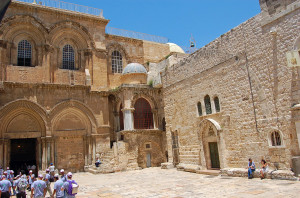For many Christians, Jerusalem’s Church of the Holy Sepulchre, said to encompass both the site of Jesus’ crucifixion and his tomb, is the holiest place on earth. Ironically, maintaining peace in this sprawling basilica requires that Muslims hold onto its only key.
In 326 A.D., Emperor Constantine ordered a church built on the site of a Roman temple after his mother Helena claimed to have learned during a visit to Jerusalem that the temple covered Jesus’ tomb. During construction, Helena is said to have discovered the “true cross” on which Jesus was crucified and a chapel was built on the site of that discovery. Different Christian groups later built additional chapels near the original church.
During the Crusades, all the structures now constituting the Church of the Holy Sepulchre were consolidated under a single roof and a single entrance. Six Christian groups ended up controlling parts of the same building. Because of their different beliefs and traditions, these groups have long squabbled over everything from the theological to the territorial. They have not even been able to agree on which of them should possess the ancient key to the only entrance. As a result, since 1187 the key to the Church of the Holy Sepulchre has been held by two local Muslim families, one of which opens the church while the other closes it.
In 1853, in an effort to eliminate ongoing disputes, a formal agreement was reached to maintain the status quo. It has not worked. In 2002, a Coptic monk moved a chair about eight inches from its traditional location. The ensuing melee sent 11 people to the hospital. In 2004, another fight broke out after a traditionally closed door was left open.
Before 1853, someone placed a small wooden ladder below a second story window to the right of the entrance. With no agreement on a new location, the ladder cannot be moved. In 1964, Pope Paul VI decreed that this so-called “immovable ladder” should stay put until the great schism of 1054 that divides the Roman Catholic and Greek Orthodox churches has been overcome. The world waits.

Comments are closed.